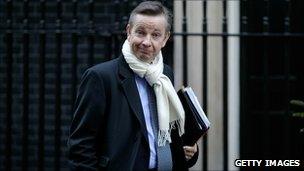Education in England: Review of 2010
- Published

Tuition fee protests turned violent and some even attacked Tory HQ
2010 was the year the spending axe fell and the students took to the streets.
For some it was their "annus horribilis". For others, it was an overdue correction to centralised control and unaffordable spending.
It was an extraordinary year that started quietly, but ended with violent protest and the hasty dismantling of familiar parts of the education landscape.
Along the way there was also a bonfire of quangos, a test boycott, the scrapping of Educational Maintenance Allowances, a new Education Secretary, and even a coalition government.
Indeed, 2010 had more twists and turns than "Strictly Come Dancing".
In my many years reporting on education only two other years have matched this intensity of change: 1988, when Margaret Thatcher turned her radical zeal towards schools, and 1997, when Tony Blair began his "education, education, education" blitz.
'University meltdown'
Although 2010 was dominated by political change, the year was sandwiched between two crises caused by the weather.
In January, the qualifications watchdog Ofqual tried to calm parents after students missed exams because of the big freeze.
Eleven months on and the weather was playing havoc again with heavy snow forcing school closures and Ofqual issuing contingency plans for the January 2011 exam season.
Back in January 2010 there were other signs of things to come. The "ghost of Christmas past" seemed to be jangling his chains in a warning of worse to follow.
First, new statistics revealed rising numbers of schools were reporting deficit budgets while others were hoarding almost £2bn against rainy days to come.
Second, a group of leading universities warned the university system faced financial "meltdown".
They were responding to what, with hindsight, now seem minor spending cuts.
Universities were not the only ones predicting the future.
The pledge
In January, the Liberal Democrat leader, Nick Clegg, warned his party they might have to delay plans to abolish tuition fees as the money would be needed for other priorities.
Despite that, the Liberal Democrats went into the May election with a manifesto promise to "scrap unfair university tuition fees".
The other main parties remained dormouse quiet on the issue.
The Conservative manifesto was light on the small print, especially on funding, but promised to import school reforms that "have worked so well in countries like the USA, Canada and Sweden".

Michael Gove has been at the heart of the government education reforms
Labour's manifesto was surprisingly downbeat and amounted to little more than an offer of more-of-the same. And it offered one of the year's greatest under-statements when it said "funding will not rise as fast as in recent years".
After the inconclusive General Election result on May 6, education proved key to the talks that brokered the coalition agreement.
In his "big, open and comprehensive offer" to the Liberal Democrats on May 8, David Cameron stressed the potential agreements on education policy, specifically the pupil premium.
Once the ink was dry on the coalition deal, Michael Gove was appointed Education Secretary at the re-named Department for Education.
Meanwhile, Vince Cable took overall control of universities and further education as the new Business Secretary. With the fees decision looming, some saw it as a poisoned chalice.
But before the long-awaited Browne Review proposed removing the cap on tuition fees, there was a stream of policy announcements covering all areas of education.
Gove's wobbles
An Academies Act was rushed though Parliament, allowing existing schools to convert to academy status and permitting new providers to open Swedish-style "free schools".
And then the cuts started. Amongst the first of many quangos to go was Becta, the schools IT advisory body, followed by the General Teaching Council for England and the QCDA.
The sudden termination of Labour's Building Schools for the Future programme brought the loudest howls of anguish.
Amid bureaucratic confusion over which projects had survived the guillotine, Mr Gove's political career wobbled. There was another, smaller wobble over plans to cut School Sports Partnerships.
Amid all this excitement, the first A* grades were awarded at A-level and a White Paper promised tougher exams and reforms to teacher training.
None of this came in time to prevent England falling further down the international league table of pupil attainment
Meanwhile, a quarter of primary schools failed to report national curriculum results as the NAHT and NUT unions boycotted the tests for 11 year-olds.
The NAHT subsequently called off its 2011 boycott in the hope that the new government had listened to its concerns.
However, Michael Gove said next year's tests will proceed, pending a review of the curriculum and assessment.
But 2010's "el gordo" was undoubtedly October's Comprehensive Spending Review.
University teaching budgets were slashed in anticipation of future higher income from fees.
Schools appeared to have been protected, and there was even a promise of a real terms increase in funding. But the rate, 0.1%, was so tiny that it evaporated into a cut after inflation predictions were updated.
Further Education did not fare so well, taking a 25% cut over four years, and "Train To Gain" was axed. However adult apprenticeships received a £250m a year boost.
And teachers, lecturers and all other staff working in public sector education had their pay frozen.
For schools the sweetener was the pupil premium, but it emerged that this will start modestly at £430 per pupil and will only reach the promised £2.5bn after 4 years. And because of the funding settlement, this year at least, it is not extra money.
Privatisation
So we enter 2011 with a school and university system that - in England, at least - is being radically reinvented, whilst in Scotland, Wales and Northern Ireland devolution makes it increasingly difficult to generalise about a UK education system.
In England, the flow of schools converting to academy status was growing by the end of the year. When it comes to the appetite for free schools, it's only a trickle.
But it is universities that face the biggest upheaval as, over the next few months, they must decide what fees to charge from 2012.
One relatively unnoticed event could turn out to be a portent for 2011: the granting of university college status to BPP, part of the US-based, for-profit Apollo Group.
While attention has been focussed on fees, the really big change could turn out to have been the effective privatisation of university teaching and the new market that might herald.
Mike Baker is a freelance journalist and broadcaster
- Published29 December 2010
- Published27 December 2010
- Published20 December 2010
- Published5 July 2010
- Published10 December 2010